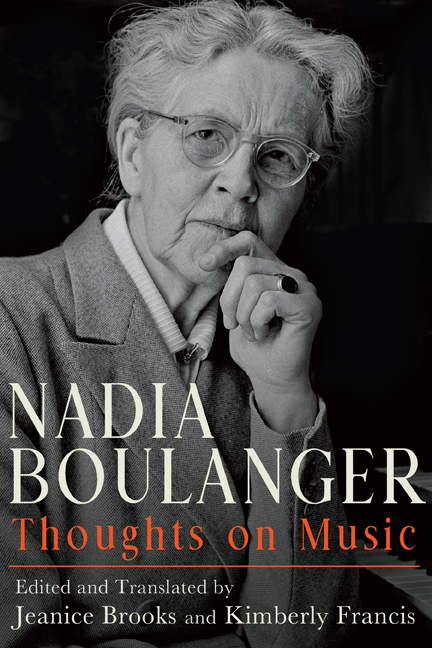Book contents
- Frontmatter
- Contents
- List of Illustrations
- Acknowledgments
- Editorial Apparatus and Critical Notes
- Note on Translations
- List of Abbreviations
- Timeline of Nadia Boulanger’s Life
- Introduction
- Part One Journalism, Criticism, Tributes
- Part Two Lectures, Classes, Broadcasts
- Bibliography of Nadia Boulanger’s Published Writing
- General Bibliography
- Index
“Les Premières Auditions” Spectateur 3, no. 84 (January 7, 1947): 6 (complete text)
Published online by Cambridge University Press: 15 October 2020
- Frontmatter
- Contents
- List of Illustrations
- Acknowledgments
- Editorial Apparatus and Critical Notes
- Note on Translations
- List of Abbreviations
- Timeline of Nadia Boulanger’s Life
- Introduction
- Part One Journalism, Criticism, Tributes
- Part Two Lectures, Classes, Broadcasts
- Bibliography of Nadia Boulanger’s Published Writing
- General Bibliography
- Index
Summary
Concerts Reviewed
January 10, 1947 (Salle Gaveau, Concerts Colonne)
Concerto for Piano and Orchestra, op. 42, Arnold Schoenberg Moïse (Opus americanum no. 2), op. 219, Darius Milhaud
January 12, 1947 (Salle Pleyel, Concerts Lamoureux)
Symphony no. 3 “Eroica,” E-flat major, op. 55, Ludwig van Beethoven Prélude, Sarabande, Toccata, Marguerite Roesgen-Champion
Pavane pour une infante défunte, Maurice Ravel
Trois poèmes, Ivan de Maigret*
Les Préludes, Franz Liszt
Certainly, last Friday night the Salle Gaveau did not have the look it usually does; crowds formed starting at the vestibule; many very young, animated, impatient faces. It is easy to see that this concert was an event for these young people. What work drew them here like this, which personality fascinates them so, what trend has them in its grip? It is Arnold Schoenberg's Concerto, it is Schoenberg and his ideas, it is the Schoenbergien language.
There is no need to debate Mr. Schoenberg's value—it is undeniable. But it is difficult to believe that so many young minds today can still be under the influence of his tormented, romantic art. Do they really think they will find a way forward in a system that seems to ignore or forbid escape and is based only on the most complex relationships between sounds? Do they adopt this system out of conviction or out of unease? Are they making this slightly desperate attempt because they no longer know where to go (one of the most talented among them said, “It is an experiment that one must try.”) or, confident of having found their path, are they ready for all the sacrifices, all the renunciations required to build on a foundation whose solidity they have tested?
For a long time, Arnold Schoenberg's music has aroused zealous enthusiasm and unresolved antagonisms, and sometimes, too, an indifference that is a little exasperating, but no one has ever even thought of debating the mastery with which it is implemented. Unfortunately, the artistic devices this music uses are so complex that it is difficult to ascertain them all through hearing, and, what is more, because it seems that everything is sacrificed for the sake of intellectual pursuits, this music remains enigmatic and inhuman.
- Type
- Chapter
- Information
- Nadia BoulangerThoughts on Music, pp. 257 - 259Publisher: Boydell & BrewerPrint publication year: 2020



